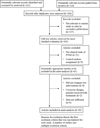Meta-analysis of dropout in treatments for posttraumatic stress disorder
- PMID: 23339535
- PMCID: PMC3893277
- DOI: 10.1037/a0031474
Meta-analysis of dropout in treatments for posttraumatic stress disorder
Abstract
Objective: Many patients drop out of treatments for posttraumatic stress disorder (PTSD); some clinicians believe that trauma-focused treatments increase dropout.
Method: We conducted a meta-analysis of dropout among active treatments in clinical trials for PTSD (42 studies; 17 direct comparisons).
Results: The average dropout rate was 18%, but it varied significantly across studies. Group modality and greater number of sessions, but not trauma focus, predicted increased dropout. When the meta-analysis was restricted to direct comparisons of active treatments, there were no differences in dropout. Differences in trauma focus between treatments in the same study did not predict dropout. However, trauma-focused treatments resulted in higher dropout compared with present-centered therapy (PCT), a treatment originally designed as a control but now listed as a research-supported intervention for PTSD.
Conclusion: Dropout varies between active interventions for PTSD across studies, but variability is primarily driven by differences between studies. There do not appear to be systematic differences across active interventions when they are directly compared in the same study. The degree of clinical attention placed on the traumatic event does not appear to be a primary cause of dropout from active treatments. However, comparisons of PCT may be an exception to this general pattern, perhaps because of a restriction of variability in trauma focus among comparisons of active treatments. More research is needed comparing trauma-focused interventions to trauma-avoidant treatments such as PCT.
(c) 2013 APA, all rights reserved
Figures


References
-
- Arntz A, Tiesema M, Kindt M. Treatment of PTSD: A comparison of imaginal exposure with and without imagery rescripting. Journal of Behavior Therapy and Experimental Psychiatry. 2007;38(4):345–370. - PubMed
-
- Baldwin SA, Berkeljon A, Atkins DC, Olsen JA, Nielsen SL. Rates of change in naturalistic psychotherapy: Contrasting dose–effect and good-enough level models of change. Journal of Consulting and Clinical Psychology. 2009;77(2):203–211. - PubMed
-
- Begg CB, Mazumdar M. Operating characteristics of a rank correlation test for publication bias. Biometrics. 1994;50(4):1088–1101. - PubMed
-
- Benish SG, Imel ZE, Wampold BE. The relative efficacy of bona fide psychotherapies for treating post-traumatic stress disorder: A meta-analysis of direct comparisons. Clinical Psychology Review. 2008;28(5):746–758. - PubMed
-
- Bichescu D, Neuner F, Schauer M, Elbert T. Narrative exposure therapy for political imprisonment-related chronic posttraumatic stress disorder and depression. Behaviour Research and Therapy. 2007;45(9):2212–2220. - PubMed
Publication types
MeSH terms
Grants and funding
LinkOut - more resources
Full Text Sources
Other Literature Sources
Medical

